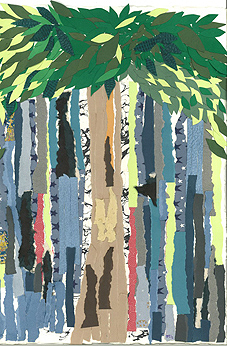The Global South and Cultural Struggles: On the Afro-Asian People's Solidarity Organization
Duncan Mceachern Yoon
The trope of rape in regards to the African continent is not groundbreaking, yet this articulation of African colonialism comes from outside of a colonizer and colonized framework. However paradoxical given its Soviet source, the poem is an attempt to affirm the solidarity of a global humanism. In contrast to Tursun-Zade’s continental scope, Han Pei-ping’s poem begins with the speaker walking through the night in Guinea, where he suddenly encounters the sound of drums: “African drums, African drums / creation of the highest / human genius; their beating /expressing deep emotion / then the joy of the people / in so complete a way“ (Poems 47). This focus on drums and rhythm as emblematic of some African essence is reminiscent of Léopold Sédar Senghor’s invocation of rhythm in his valorization of négritude. However, in contrast with the Tursun-Zade’s poem, Han is not writing from a geographic distance. He is writing from his first-hand experience in Sékou Touré’s Guinea. The poem emerges as a sensory catalogue of the poet’s encounter with the country’s landscape. Han’s voice is particularized to his experience. The drums are literally speaking to the poet and explain a cultural logic: “Drum beats can express / welcome to guests; entertaining / them with notes of happiness; / Drum beats can praise a woman’s / beauty, in front of all“ (Poems 47). While indicative of the language barrier Han is in the midst of encountering, it is also an attempt to affirm the humanism Senanayake describes in the preface. Both poems focus on some stereotypically exotic aspect of African society− the black body or the rhythm produced from drums. However, they also are interested in extrapolating from the African circumstance into a larger, global context. Tursun-Zade concludes: “Cheers for Africa’s freedom re-echo through nations and lands / To New Africa gladly extending in / friendship their hands“ (Poems 143). Han’s is equally as effusive and generalized: “Drums that now beat for freedom / and independence; in their / throbbing is the deep note of / indignation, while sounds / of joy rise to the clouds“ (Poems 49). The movement from a more specific geographic context into the realm of transnational solidarity enacts the Bureau’s commitment to forging cultural links outside of colonial power dynamics. The fact that there are both Soviet and PRC imaginaries of African spaces within one anthology demonstrates an attempt to imagine an alternative modernity within the fraught context of the Cold War. Their categorical, almost propagandistic affirmation of this solidarity would be proved ironic given historical hindsight and to points to the instrumentalization of the Bureau’s definition of humanism by realpolitik. In this sense, it is important to distinguish between the geopolitics of the Cold War period (and its divisions of first, second, and third worlds) and the 21st century moniker of the Global South. The disaggregation of Western modernity by the AAPSO and the attempt to reimagine alternatives was one of the major socio-cultural movements of the sixties and seventies. While this essay has only briefly discussed two poems from the AAPSO Writers Bureau’s first publication, it has shown how this organization was engaged in the creation of a space for a humanism defined for and by the “wretched of the earth.“ While the Bureau’s definition of humanism signaled an opening of possible alternatives, it was soon reduced to propaganda by competing national self-interests. Despite this instrumentalization, the Bureau was an attempt to move beyond national categories in its conception of literature and the world. It also provides a cultural historicization of what is now called the Global South in the contemporary context. References Afro-Asian Peoples’ Solidarity Conference, Conakry-11-15 April, 1960: Opening Speeches, Closing Speeches, Resolutions, Declarations. Cairo: The Permanent Secretariat, 1960. Afro-Asian Poems: Anthology. Colombo: Afro-Asian Writers’ Bureau, 1963. Print. Césaire, Aimé. Discourse on Colonialism. New York: MR, 1972. Fanon Frantz. The Wretched of the Earth: Frantz Fanon. New York: Grove Press, 2004. Césaire, Aimé and Robin D. G. Kelley. Discourse on Colonialism. New York: Monthly Review Press, 2000. Print. Pages: 1 2 3 4 5 6 |
Essays in this Forum
Rethinking the Global South
by Mukoma Wa Ngugi From Indian Literature to World Literature: A Conversation with Satya P. Mohanty by Rashmi Dube Bhatnagar and Rajender Kaur Asia in My Life by Ngugi wa Thiong'o The Global South and Cultural Struggles: On the Afro-Asian People’s Solidarity Organization by Duncan Mceachern Yoon The Fault Lines of Hindi and Urdu by Sanjay Kumar Reframing Colonialism and Modernity: An Endeavour through Sociology and Literature by Gurminder K. Bhambra Varieties of Cultural Chauvinism and the Relevance of Comparative Studies by Tilottoma Misra Literature to Combat Cultural Chauvinism: A Response by Shivani Jha Is There an Indian Way of Thinking about Comparative Literature? by E. V. Ramakrishnan Modernity and Public Sphere in Vernacular by Purushottam Agrawal West Indian Writers and Cultural Chauvinism by Jerome Teelucksingh Oral Knowledge in Berber Women’s Expressions of the Sacred by Fatima Sadiki |
